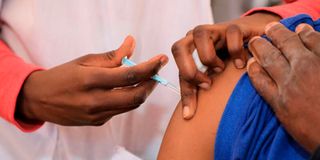Premium
Covid-19: The lessons and what to expect in 2022

A nurse administers Covid-19 vaccine to a member of the public at Kencom Bus terminal on December 23, 2021.
The rapid spread of Covid-19 demonstrates how interconnected the world is. Even with the attempts by countries to limit movement, no effort has proved effective enough to keep the virus at bay.
At the beginning of 2021, the global community was optimistically talking of a post-covid era, complete with plans for recovery and resumption of global connectivity.
This was dealt a blow in November 2021, when the new Omicron variant was discovered. It was a great relief that the new variant appeared to cause less severe disease.
Kenya, for instance, has witnessed the highest positivity rate of more than 30 per cent. Yet this has not been followed by an upsurge in admissions or mortalities.
Some scientists have cheekily labelled the Omicron as “nature’s vaccine”, contending that the high rate of infections and low risk of death effectively confers protection against future covid infections. This must be taken with a dose of caution, though.
The virus has exposed the inequalities that exist in today’s world. Africa remains under-vaccinated at a time when some countries have given their entire populations boosters and are now discussing the fourth dose.
Secondly, the virus conferred to science the blessing of massive developments. Before this pandemic, the mumps vaccine awed scientists for its discovery in a record four years.
This time round, it took one year for various research institutions to bring forth vaccine candidates.
Disappointingly, none of the vaccine candidates came from Africa or the global south, simply because not a single public research institution or private pharma in Africa could muster enough funding to successfully develop and test a vaccine.
This should be a sting in the hearts of our leaders and a major agenda item for discussions at the African Union and East African Community.
The pace of evolution of science has been frenetic during this period. During the peak of the Omicron surge in December 2021, it is possible that community spread has happened in an unprecedented scale. Locking down communities is therefore akin to locking the stable when the horses have left.
Mutagenic potential
The virus has a high mutagenic potential, and more surprises await us. At this point what is needed is wide coverage of vaccination, readiness of health facilities to take up casualties when need arises and availability of medical supplies.
Covid-19 has greatly disrupted other health services, such as provision of oncology care, HIV prevention and treatment, mental health care and maternal and child health.
As we battle this scourge with the available resources, we must be vigilant not to witness an explosion of HIV infections, rolling back the significant gains of the last two decades.
Perhaps the greatest lesson we have picked is the need for a properly functioning healthcare system, synergising private and public health facilities.
With the world locked down, even the mighty realised there comes a time when health facilities abroad are not accessible.
It will take decades to repair some of the damage wrought by the pandemic. Before that happens, resilience is needed at the personal, community, national and international levels.
We might need several doses of the vaccine, or perhaps periodical doses. The evolving science will have an answer to this in the coming year.
Dr Bundi Karau is a Consultant Physician and Anatomist, and an education advocate.


